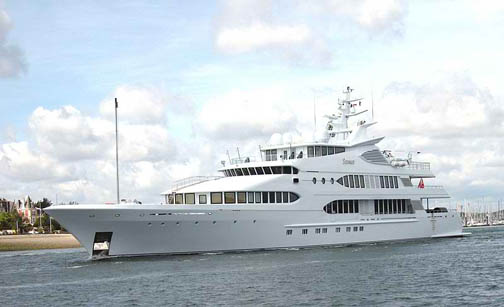Pierluisi bill approved in Congress gives nautical tourism a boost


Puerto Rico has been missing out on benefiting from the Caribbean's multi-million dollar nautical tourism industry. (Credit: Wikipedia)
Resident Commissioner Pedro Pierluisi scored an important victory for himself and the island’s nautical tourism sector Tuesday, with the approval at the U.S. House of Representatives of HR 2838, which authorizes foreign-flagged vessels that are more than 100 gross tons to transport tourists and other paying passengers between ports within Puerto Rico.
The amendment to the Passenger Vessel Services Act of 1886 “removes an outdated obstacle that makes it impossible for the U.S. jurisdiction to Puerto Rico with foreign jurisdictions when it comes to attracting investment in nautical tourism. Increased nautical tourism has the potential to create new jobs and spur economic growth in the territory,” he said.
Current federal law allows foreign-flagged vessels to transport tourists and other customers from a port in Puerto Rico to any port in the Caribbean region outside of Puerto Rico, including to ports in the neighboring U.S. Virgin Islands, where the Passenger Vessel Services Act does not apply.
Yet, these same vessels cannot be used to transport tourists and other paying passengers between Puerto Rico’s active ports, which include the federally-maintained harbors in San Juan, Ponce, Mayagüez and Arecibo; harbors in coastal municipalities Aguadilla, Fajardo, Yabucoa and Guayama; and harbors in the outer islands of Vieques and Culebra.
“So, for example, individuals and businesses cannot charter foreign-flagged megayachts, superyachts, or specialty cruise passenger ships for tourists and other customers who would like to travel between Puerto Rico’s various marinas,” he said. “My amendment would allow individuals and businesses to charter a foreign-flagged vessel for sailing between ports in Puerto Rico if the vessel in question exceeds 100 gross tons.”
“The purpose of the amendment is simple and straightforward: to expand nautical tourism in Puerto Rico and, by doing so, to create jobs and spur economic development on the island,” said Pierluisi. “While the increased nautical tourism that the amendment would allow will not alone solve these problems, it does have the potential to make a meaningful difference for communities and constituents in Puerto Rico.”
For years, nautical tourism in Puerto Rico has been lagging in comparison to the rest of the Caribbean islands, where that sector is thriving and has driven governments and private sector investors to pump millions into fancy marinas and other related facilities to provide services to the visiting ships.
“More ships means more shore-side investment. Ships require repair work, spare parts, and fuel. Their owners pay insurance and docking fees,” Pierluisi noted. “And when the tourists and other passengers on these vessels disembark at different Puerto Rico ports, they eat at restaurants, go shopping, rent cars and inject money into the local economy in countless other ways.”
Other benefits of HR 2838
The bill, also known as the Coast Guard and Maritime Transportation Act of 2011, also authorizes, and provides the resources for, the U.S. Coast Guard to carry out its broad responsibilities throughout the U.S., including in Puerto Rico.
The Coast Guard enforces federal laws in U.S. and international waters, and safeguards the coasts from crime and environmental risk and is also charged with certifying vessels to legally transport passengers between any two U.S. ports, including between ports within Puerto Rico, and between ports in Puerto Rico and ports in the U.S. mainland.
Section 601 of the bill requires the Commandant of the U.S. Coast Guard to submit a report, within 180 days after the bill is enacted into law, regarding the agency’s drug interdiction efforts in Puerto Rico and the broader Caribbean region.






